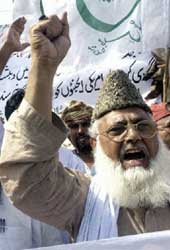|
French Hijab Ban Must Not Push Girls Out Of School: U.N.
 |
|
Protests were staged in Karachi and other cities after Friday prayers
|
Additional
reporting by Asif Farooqi, IOL Correspondent
KARACHI
, June 4 (IslamOnline.net & News Agencies) – A strike was held
in
Karachi
Friday, June 4, to protest against the recent wave of violence, which
analysts fear would hurt the government’s efforts to bring home
political stability and more foreign investments.
Witnesses
said the city was at a standstill, with business plazas closed and
retail traders pulling down their shutters for the strike called by
the Muttahida Majlis-e-Amal (MMA) alliance.
The
religious group also staged protests in
Karachi
and other cities after Friday prayers, following a wave of violence in
the city that has left more than 50 people dead.
"The
city is closed but the strike is peaceful and we have got no reports
of violence as yet," city police chief, Tariq Jamil, told Agence
France-Presse (AFP).
He
said 18,000 police and paramilitaries were deployed to guard places of
worship, diplomatic missions, sensitive installations and Western
establishments as well as hotels and restaurants.
Not
Sectarian
IslamOnline.net
correspondent said that Qazi Hussein Ahmed, the leader of the MMA
alliance, insisted that recent incidents of violence in
Karachi
were not linked with religion or sectarianism.
Ahmed
blamed the government for negligence and said one coalition partner in
Sindh provincial government was behind these killings.
Karachi
was rocked by five deadly attacks last month including two suicide
bombings at Muslim Shiite mosques in which 45 people were killed.
The
death toll from a powerful
explosion ripped through Shiite's Ali Raza mosque on Monday,
May 31, rose to 22, a day after the assassination
of prominent Sunni scholar Mufti Nizamuddin Shamzai in the same area.
On
May 7, a suicide bomber blew himself at Hyderi Shiite mosque, killing
23 worshippers. Each attack triggered violent rioting, with five
people killed in crossfire with police.
 |
|
Pakistani Shiite activists were seen burning a banner made of U.S., Israeli and British flags during a demo in Islamabad
|
MMA
also staged demonstrations in main Pakistani cities of
Islamabad
,
Lahore
, Mutlan,
Peshawar
and
Quetta
. The speakers at the rallies "condemned" the killings and
called for arrest of culprits.
Bearing
Brunt
Analysts
and economic experts believed that the latest spate of violence has
put hopes for political stability and more investments on the line.
Killings
of Shiite Muslims in bloody mosque attacks have triggered street
violence in the port city, with mobs burning shops, cars, buses and
government buildings, virtually shutting down commercial life in a
city of 14 million people.
"These
attacks are a serious threat to the stability of the country and have
increased the political risk for offshore investors," Arshed
Arif, a prominent economist and head of research at KASB Securities in
Karachi
, told IOL.
Arif
noted the attacks came at a time when
Pakistan
is desperately trying to tap international capital ahead of its plan
to exit from an International Monetary Fund three-year lending program
later this year.
The
country's top business body, Federation of Pakistan Chambers of
Commerce & Industry of FPCCI believes end to violence in
Karachi
is key to stability in the country.
"Such
blatant and cruel acts of terrorism tend to frustrate investment
efforts, disrupt the normal economic activities and serve the culprits
evil designs of destabilization of the socio-economic life of
Karachi
," said Riaz Ahmed Tata, the president of FPCCI while talking to
reporters.
Anila
Mehmood, another female student said she was out on the road when the
explosion took place. "It was really scary and I managed to reach
home with a lot of difficulty and everyone at my home was weeping and
crying for my safety" she said, referring to last
Monday's explosion.
Ayaz
Amir, a political analyst and a columnist, said the government can't
afford to allow
Karachi
drift into mayhem.
"
Karachi
is what
New York
is for the
United States
. Can you imagine
New York
being shut down for a day?" he said.
Amir
said these events don't appear sectarian in nature, rather they are
instigated by groups opposed to
Pakistan
's support to the U.S.-led "coalition against international
terrorism".
There
was a double car bomb attack near the
U.S.
consul-general's residence on May 26 killing one policeman and
injuring several other police and journalists.
Baqir
Sajjad, another analyst, said this was all happening to
Pakistan
because it has allied itself with the
U.S.
in war against terrorism.
"This
is the price that we have to pay for the decision we did not
make" Sajjad said.
Ordinary
Pakistanis are angry over the cooperation with
Washington
, as anti-American sentiments are growing in the predominantly-Muslim
Asian country, especially after the invasion of
Iraq
.
Pakistani
Shiite activists were seen burning a banner made of
U.S.
, Israeli and British flags during a demonstration in
Islamabad
.
Domestic
Most
of the analysts think this violence is more domestic in nature, but
have links with international terrorism.
General
Pervez Musharraf in August 2001 banned many of the hard-line religious
groups both belonging to Shiite and Sunni sects.
The
hunt for members of these banned outfits is on ever since. Many of the
known leaders from both sects have been killed and arrested during the
last two years.
"Before
being banned, these groups had representation in the parliament and
many other public forums which basically served as ventilators of
their anger" Farooq Adil, analysts and deputy editor of Takbeer
weekly said.
He
added since the public life of most members of the banned outfits no
longer exists, they are now turning towards more brutal underground
activity.
Karachi
has a history of political and ethnic rivalry, but since late 2001 the
port city has witnessed a series of bomb attacks and assassinations
motivated by religious groups opposed to the
U.S.
occupation of neighboring
Afghanistan
.
|